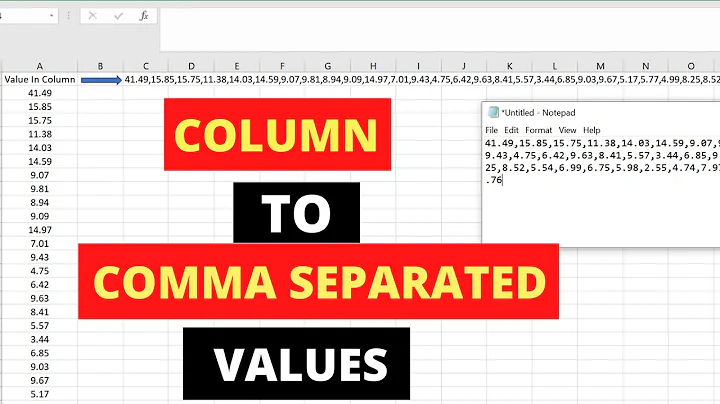How to give a comma-separated list as arguments to the next command
Solution 1
This should equally work as well:
s1 | xargs -d "," -n1 s2
Test case:
printf 1,2,3,4 | xargs -d ',' -n1 echo
Result:
1
2
3
4
If s1 outputs that list followed by a newline character, you'd want to remove it as otherwise the last call would be with 4\n instead of 4:
s1 | tr -d '\n' | xargs -d , -n1 s2
Solution 2
If s2 can accept multiple arguments, you could do:
(IFS=,; ./s2 $(./s1))
which temporarily overrides IFS to be a comma, all in a subshell, so that s2 sees the output of s1 broken up by commas. The subshell is a short-hand way to change IFS without saving the previous value or resetting it.
A previous version of this answer was incorrect, probably due to a leftover IFS setting, corrupting the results. Thanks to ilkkachu for pointing out my mistake.
To manually loop over the outputs and provide them to individually to s2, here demonstrating the saving & resetting of IFS:
oIFS="$IFS"
IFS=,
for output in $(./s1); do ./s2 "$output"; done
IFS="$oIFS"
or run the IFS bits in a subshell as before:
(
IFS=,
for output in $(./s1); do ./s2 "$output"; done
)
Solution 3
Try this:
s1 | perl -pe 's/,/\n/g' | xargs -n1 s2
Related videos on Youtube
yukashima huksay
Apparently, that user prefers to keep an air of mystery about them.
Updated on September 18, 2022Comments
-
 yukashima huksay almost 2 years
yukashima huksay almost 2 yearsI have a script
s1that outputs a list of numbers separated with ',' e.g.1,2,3,4. Now I want to give these numbers to scripts2as arguments, so that s2 will be run on each of them and output its result in a separate line. For example, if s2 multiplies numbers by two, this would be the result I'm looking for:2 4 6 8What I'm doing right now is:
s1 | xargs -d "," | xargs -n1 s2But I feel like I'm doing it in such a foolish way! So my question is:
What is the proper way of doing it?
My problem with my solution is that it's calling xargs twice and iterating over the input twice which is not reasonable to my eyes of course by means of performance! The answer
xargs -d "," -n1seems nice, but I'm not sure if it's only iterating once. If it does, please verify that in your answer, and I'll accept it. By the way, I'd rather not use Perl since it still is iterating twice and also Perl may not exist on many systems.-
 George Udosen over 6 yearsIf it's working why call it foolish. If execution time is important then that's another matter else leave here
George Udosen over 6 yearsIf it's working why call it foolish. If execution time is important then that's another matter else leave here -
 George Udosen over 6 yearsTry this
George Udosen over 6 yearsTry thiss1 | xargs -d "," -n1 s2 -
dannysauer over 6 yearsI suspect some of the issue is misunderstanding the impact of iterating. Iterating over the elements in something like an associative array is bad because of the expense of walking that data structure, but "iterating" in general is not inherently bad. Specifically, reading data line-by-line as it comes in on STDIN, isn't a huge performance problem. The performance issue here is more the cost of spawning a new process and setting up the pipeline. As long as you're not doing that frequently (as in a loop), worrying about the performance of xargs is probably an example of premature optimization.
-
-
Peter Mortensen over 6 years(The space...)
-
 MoonCheese62 over 6 yearsWhy not simply
MoonCheese62 over 6 yearsWhy not simplytr ',' '\n'? No need to invoke something as (relatively) heavy as Perl and regular expressions. -
 ilkkachu over 6 yearsAre you sure about that first one?
ilkkachu over 6 yearsAre you sure about that first one?bash -c 'IFS=, printf "%s\n" $(echo 1,2,3)'prints1,2,3on my system, i.e. there's no splitting. -
 Jeff Schaller over 6 yearsI’ll re-test in a bit, but I suspect different behavior based on builtins vs external programs.
Jeff Schaller over 6 yearsI’ll re-test in a bit, but I suspect different behavior based on builtins vs external programs. -
 ilkkachu over 6 yearssame with
ilkkachu over 6 yearssame with/usr/bin/printfand/bin/echo -
undercat over 6 years@ilkkachu You are correct, word splitting occurs before IFS is re-assigned in this case
(IFS=,; printf "%s\n" $(echo 1,2,3)), on the other hand, should work.




